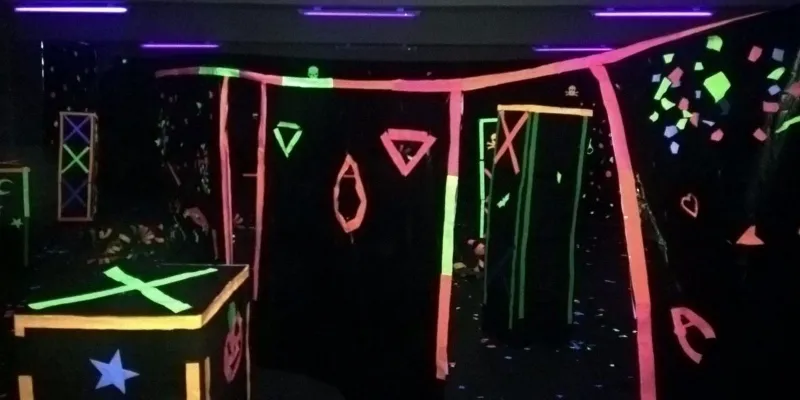Wanna play laser tag in office? This Mumbai-based startup is here to help
Bootstrapped startup GameGarage converts spaces into laser tag arenas for corporate events and individual parties, and aims to strengthen team-building skills and leadership abilities in a fun setting.
Fire away at your friends with guns - formulate strategies and ace the wargames to take your team to victory - only, no one here gets hurt (except maybe the losing team's ego) for the guns fire infrared beams that hit infrared sensitive targets worn by players.
While Laser Tag arenas are elaborately built spaces, what if you could play it anywhere?
To help physical gaming make a comeback, 34-year-old Himani Ladsariya started GameGarage that offers mobile laser tag events and setups.
Laser tag is usually played by two teams and anyone between the age of 7 and 60 years can play the game. These games may be as challenging, but the fun-filled environment creates the vibe of a party game.
Himani, who worked for Lehman Brothers, had earlier co-founded Moyyer Research, a platform to evaluate unlisted equities.
“While studying in the US, I played laser tag with friends and really enjoyed it. It was a fun and engaging team sport. After coming to India, I was exploring options to start something on my own. That’s when I started researching laser tag and its feasibility with respect to Indian markets,” Himani says.
So, late last year, she started GameGarage. Himani roped in her relative, Meeth Shaah, who worked for real estate firm Anarock and currently handles sales and marketing for GameGarage. Lancy Paul, Himani's gym instructor, currently runs operations for all their events.
The bootstrapped Mumbai-based startup conceptualises new-age games that can be played in real-life arenas using inflatable obstacles, light effects and music. The games can be played indoors and outdoors.
Today, the company has a team of eight.

Why a mobile setup?
High rental costs have made it difficult to manage laser tag setups in large cities. Himani solved this problem by importing mobile laser tag equipment, which doesn’t require a permanent setup. Himani says she invested all her savings to import this equipment.
“I began with laser tag rentals - you could rent out the equipment for a day. We received tremendous response and decided to start this in a professional manner by conducting mobile events,” she says.
However, the team took some time to find the right equipment. Himani got in touch with an American company that helped customise equipment to be used for mobile events. The equipment is designed for Indian conditions and is also cost optimised. “We import the equipment; one kit costs about $1,500, and comprises a gun and a jacket,” Himani says.
The team also worked to educate and change the consumer mindset, as playing new games is more expensive than regular gaming. Himani explains that they often offer demos.

Let the games begin
How does a game go? The equipment is for eight players, four to a team, and every game lasts five to 20 minutes. Each player gets a gun that is connected to a jacket embedded with sensors. To score a point, a player must shoot members of the opposing team. Scores are calculated on a laptop, and the team with the higher score wins. At the end of each game, players can see their individual and total team scores.
For an indoor setup, the GameGarage team darkens the room, sets up obstacles, and uses a laser projector to provide light effects with music. “For an outdoor setup, we prefer the rustic look and use bunkers, tires, drums and natural obstacles like pillars and trees,” Himani says.
She soon found that regular use of the equipment led to a lot of wear and tear and that sending the equipment back to the US for repair and maintenance required time and cost.
“Over time, we have built expertise and are now able to service and repair the equipment in-house. The challenge with scaling up is to manage inventory effectively. To solve this problem, we are building three satellite offices, in different parts of India, which will be used for storing equipment. We can reach any part of India in a day or two with these,” Himani says.

Numbers and growth
GameGarage’s customers are usually event managers, organisers, and corporates. The team charges by the hour, depending on the number of hours played. For a three-hour event, GameGarage charges Rs 13,500, and for six hours, the cost is Rs 20,000.
Himani says variable costs per event amount to Rs 2,500, including the manpower and battery costs for the equipment. Fixed overheads are 30 percent, which includes head office costs, rent, equipment depreciation and salaries. “We have tied up with various event managers to increase sales, and offer 10 percent commission to our sales partners,” she says. GameGarage claims to have organised 20 events in Mumbai so far.
Gaming companies are in the news for providing entertainment as well as varied team-building activities. Bengaluru-based Riddleroom offers different escape room-like setups for corporates and events. Meanwhile, international company Escape Room is believed to be making an entry into India soon. But these games essentially create simulated situations, like escaping prison or finding a kidnapped victim.
When compared to these players, GameGarage is different as the team focusses on mobile laser tag setups.
“Most other laser tag players have set up arenas with high capex and recurring costs. We face some amount of competition from alternative games like paintball. But unlike paintball, laser tag does not require protective gear, does not spoil surroundings as no paint is involved, and also works for younger kids,” Himani says.
The founder adds that the company wants to provide an array of premium games that have mobile setups, and can be played in a cost-efficient manner. GameGarage is currently researching new games like soapy football, mobile golf, human foosball, and many more that can be imported and played in a mobile environment at a substantially lower cost
“We are currently working on building a pan-India presence and reaching 50+ cities in the next 2 years. GameGarage would like to set up satellite teams in all the metro cities of India during the next phase of expansion,” Himani says.







